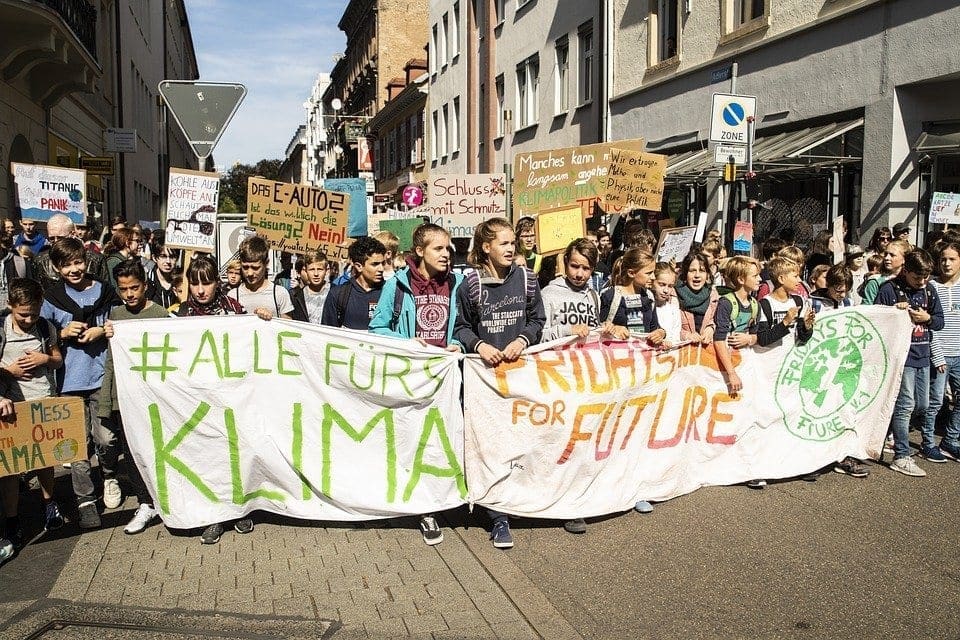Last November, the London-based organisation Julie’s Bicycle, a pioneer in supporting the creative community to act on climate change, received the award for professional excellence at WOMEX 2019, the international world music expo. The year 2019 was marked by a focus on environmental issues within the music industry: in the UK, the Music Declares Emergency movement, which has more than 3,000 artists, organisations and individual signatories to date, declared an ecological and environmental emergency, demanding systemic change; Glastonbury and We Love Green made headlines by announcing a ban on single-use plastic bottles, while Coldplay and Massive Attack finally brought the question of the environmental impact of touring into the spotlight, LED of course.
The August 2018 report from the IPCC warned that, at the time, we only had 12 years to stop the planet heating up by more than 1.5°C, the point beyond which the risk of flooding, drought, extreme heat – and the resulting poverty – would increase. While no one can now deny this reality, the music industry included, artists and professionals from a number of regions around the world did not wait for this wake-up call to initiate and exchange ideas about rethinking responses to environmental change, bringing together communities and regenerating musical practices.
A recent issue of the Journal of Ethnobiology celebrates indigenous songs and music as sources and a means of handing down traditional ecological knowledge, emphasising the importance of preserving these ancestral languages and traditions. Music is also a way of highlighting environmental struggles, promoting social discussion and action for climate justice.
In 2015, Björk called for global action to prevent the destruction of Iceland’s highlands:
While many music professionals are keen to get involved, it is sometimes difficult to know where to start or how to pinpoint the right ways to achieve genuine change. In a context in which fewer and fewer musicians can rely on album sales as a source of income, the emphasis is on touring and selling merchandise. How then can an eco-conscious response be reconciled with a status quo that involves frequent air travel? Especially in geographical areas where there are no alternatives and where access to Western music scenes is vital for artists from regions of the world where the most extreme impact of climate change is being felt. In addition, issues with visas, taxis and exclusivity clauses imposed by some music venues and festivals are yet more obstacles to touring in a way that reduces the carbon footprint.
The music project The Nile Project, founded in Aswan (Egypt) in 2013, offers an innovative example of intercultural dialogue and environmental action:
The recent cancellations of festivals such as Lost Paradise and A Day on the Green in Australia have raised questions about the future of summer festivals in the face of the threat of increasingly extreme weather. It is no longer a question of reducing emissions, but of adapting to a new situation. Spearheading the music industry’s environmental commitment, festivals are laboratories for experimentation and risk-taking, able to offer us the vision of a more sustainable world and suggest solutions that can be taken up in our daily lives.
The Brazilian rapper Edgar, who performed at the Les Escales and Trans festivals, describes himself as an “artivist” and makes his costumes from recycled materials:
Another major global challenge in the years to come will be the impact of streaming. While the advent of digitisation has encouraged the circulation of music, the broadening of audiences and their permeability, its environmental cost is often overlooked. In his recent book Decomposed. The Political Ecology of Music, Kyle Devine, co-author of the academic study The Cost of Music, demonstrates that while the global production of plastic in the recording industry has fallen, the transition to streaming recorded music has resulted in significantly higher carbon emissions than at any other time in the history of music. He adds: “The amount that people are streaming and downloading is increasing at such a rate that they may outweigh any gains in the efficiency of the system. […] Once we take into account places where streaming is huge – China, Africa or India – places where there are less stringent requirements on the generation of power for the Internet, I don’t have those numbers, but my sense is the picture gets even uglier”.
In 2019, Fulu Miziki performed for the first time outside the Congo at the Nyege Nyege Festival; the group has developed their sound from recycled objects, building a futuristic narrative inspiring eco-awareness and resilience:
Music has the power to cross borders and bring people together. It embodies the notion that we are all in the same boat and that this is a multifaceted global problem. Beyond a need for the implementation of a catalogue of best practices, a different story must be told in the face of environmental challenges; as suggested by the philosopher Malcolm Ferdinand, author of Une écologie décoloniale. Penser l’écologie décoloniale à partir du monde caribéen [Decolonial Ecology. Thinking of Ecology from the Caribbean World], we must make the planet the focus of ecology: “Talking about a climate emergency is all very well, but it is important to understand that this is not enough as a response. Rather than taking a solely environmentalist approach, the goal is also about politics, society and mindsets”. This is undoubtedly where we, those involved in the world music industry, can add our voices.


